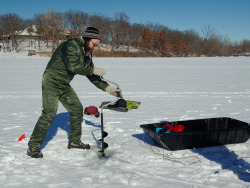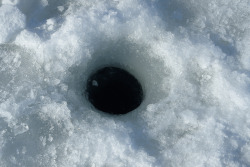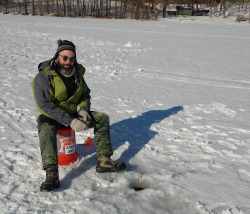Steven Lang
The Spirit of Competition
Note: Steven wrote this essay during his Coffee House Press: In the Stacks residency in February 2016. He stayed in Silverwood Park, which is part of the Three Rivers Parks District, in the Traveling Museum, a small icehouse that was modified to serve as a writer’s studio.
“Everyone should believe in something; I believe I’ll go fishing.” –Henry David Thoreau
The current presidential election season has got me thinking about the vices and virtues of competition. Is competition natural? In other words, is survival of the fittest really survival of the most competitive? I’m not entirely sure. But, lately, I have observed that competition—not just in the Darwinian sense, but in the free market, capitalist, what’s-in-it-for-me sense—hates to wait. That is, whenever and wherever an opportunity to take advantage presents itself, competition always rears its head, and strikes. Competition is pervasive, and that’s not necessarily bad, but it can enter things subtly, even covertly. When you least expect it, you can find yourself in deep. Whether in sports, love, politics, academics, or business, competition has as many flavors as it does names: brinksmanship, jockeying, courting, debating, defense spending, duking, jousting, ice fishing.
Okay, wait. Anybody with a grub worm’s worth of sense knows that ice fishing, while perhaps open to various levels of friendly competition, isn’t one of humanity’s great, historical conflicts, such as that between rich and poor, or church and state, or lick stamps and those annoying self-adhesive ones. But some poor sap had to be the first person (freezing, hungry, perhaps bored) to chop a hole in the ice and resume what had been in warmer months either a pleasant pastime or a means of survival, or both. In other words, if you fish, you don’t quit just because a few inches of frozen water is playing its frigid hand. You don’t wait. You call its bluff. You get into your warm gear, you get your bait and tackle together, and you auger, dammit, you auger.

I hope I’m not being overly dramatic. But I’ve come to learn that ice fishing has its own value system, as does capitalism, socialism, and nature itself. I have no doubt that ice fishing’s existence is only partly invention, the other part being inevitable and natural, like footprints in snow, or like competition itself, which was my original point, but I digress. What I’m here to tell you is that ice fishing, at its best, transcends competition, providing what is ultimately a transformative experience.
Ice fishing is transformative because it suggests that there is more to life than just taking sides in the monolithic contests our culture prescribes to us. It does this in several ways. First, and I believe foremost, ice fishing asserts that reality is mostly hidden, that you have to drill down to find it, and that you’ll only ever see a tiny sliver of it. And much of what we seek in life is on the “other side.” Second, it subverts the doggerel of competition (try try again, quitting is for losers, cheaters never prosper, etc.) by literally freezing it out of the equation. To be on the ice is to be together on the ice, and if you’ve ever heard ice crack from the middle of a lake then you know what that kind of togetherness feels like. It’s not a basketball court. Finally, in that same sense, ice fishing suggests that you can win merely by participating. This is crucial information that can only be learned firsthand, information a political debate cannot provide, because debates are not staged in the freezing cold, nor in high winds and glaring sun, with airborne ice crystals that sting your lips and ears, and you do not need a $12, three-day debate license to watch one.

Speaking of license (creative and otherwise) a one-day fishing license when I went to buy one at the gas station was $10, and a three day’er was $12. I didn’t plan to be out there quite that long, but I was worried I might be, so I sprang for the extra two days. I arrived at Silverwood Park with a fishing license just minutes old, wearing a nylon snowmobile suit, thermal underwear, wool socks, insulated boots, and a new pair of deluxe Yaktrax. (I had been to REI the night before.) I was to meet Three Rivers Park District naturalist and educator, Alyssa Riggs, who would provide the necessary equipment and expertise. “The first order of business is safety,” she said. “I see you’re dressed the part.” I showed her my fishing license. “Here, keep these warm.” She handed me a small container of grub worms. I put them in my pocket. She had everything else we needed packed up in a plastic sled. We checked in with the park staff and headed for the lake.
In winter, I learned, the fish in Silver Lake tend to move from the deepest areas toward the shallower spots during the daytime to feed. It is in these transitionary locations that we would be most successful. So, once we pulled our gear out onto the lake, we looked at a map of water depth provided to us by another Three Rivers naturalist, David Donovan. But with no good way to measure our location except dead reckoning, we put the map away. Instead, we opted to fish where others had already been. This made sense to me. When we came to a place on the ice where we saw lots of frozen-over fishing holes it was time to pull out the auger and get busy. Once through the ice, the next step was to measure the water depth with a small weight. We then set our lines so the bait would be dangling just above the bottom, perhaps 20 feet down. From there, we pulled out the grub worms, baited our hooks, bated our breaths, and let the hooks drop into the abyss. After that, we sat on plastic buckets for an hour and nothing happened.

While a grub worm on a hook must look pretty appetizing 20 feet below the surface in mid-February, alas on this day no fish seemed to think so. But I didn’t mind. Waiting was just fine. I was in good company, in good clothes, and in good spirits. If ice fishing is competition at all, it is mainly competition with the self, making success difficult to gauge. Yet I came away feeling I had somehow won.
Steven Lang received his B.F.A. from the University of Minnesota, Twin Cities. His visual work has been featured at the Soap Factory, Rosalux Gallery, and Soo Visual Arts Center. He was the recipient of a Loft Mentor Award for 2013-2014, and was a recent resident artist at Elsewhere, a living museum set in a former thrift store in Greensboro, North Carolina. His stories were included in the anthology Fiction on a Stick, published by Milkweed Editions, and The Art of Wonder, published by the Minneapolis Institute of Art.
Photos courtesy of the artist. You can follow Steven at thequakingblog.tumblr.com.